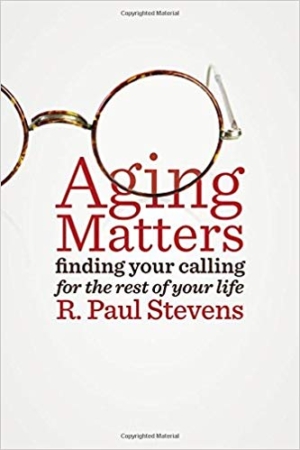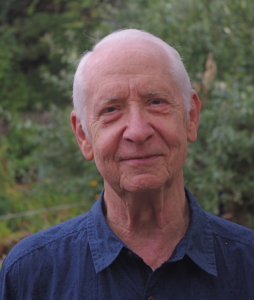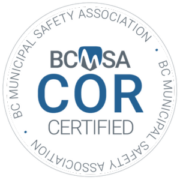Aging Matters; finding your calling for the rest of your life by R. Paul Stevens
Book Review by Barrie McMaster
 Pastor, professor and author Paul Stevens has a winning book. If the title does not appeal to you, wait until you discover he’s not just talking about your actual earth-life, but also about your life in eternity. That’s a dazzling concept — and it adds a new dimension to the quest to discover how God has gifted and guided you, because the answers might stretch forth a great deal farther than you think!
Pastor, professor and author Paul Stevens has a winning book. If the title does not appeal to you, wait until you discover he’s not just talking about your actual earth-life, but also about your life in eternity. That’s a dazzling concept — and it adds a new dimension to the quest to discover how God has gifted and guided you, because the answers might stretch forth a great deal farther than you think!
“Aging is a paradox. Everyone wants to live longer, but none of us wants to get old,” says Stevens. So, Aging Matters is a practical book, covering a broad spectrum of topics on getting old while living longer. It is based on a course offered at Vancouver’s Regent College and its purpose is to illuminate how we all might live the “third third” of our lives well. It’s also formatted at chapter ends with questions to discuss in a study group.
Stevens delivers on his title: how do you view your actual calling in life – and what do you do in retirement? He also talks about taking responsibility for your own health, your relationships, and your resources. He examines spiritual development and in this, it’s a Christian book, but not a book only for Christians.
Stevens brings insight to the question of vocation, of calling. You need to integrate your calling with social life and friendships, with ‘play’(including travel or hobbies), with creativity, and with lifelong learning, he says. It is obvious since the economic shift of 2008 that many people who wanted to retire cannot afford to, so they continue working because they must. He writes about that kind of “retirement”, too, because everyone keeps on aging!
Stevens draws a sharp line between our actual ‘vocation’ – how God wired us and gifted us – and ‘occupation’ as the formal “doing” of our gifting. He quotes Elizabeth O’Connor (The Eighth Day of our Creation): “We ask to know the will of God without guessing that his will is written into our very beings.” So how the “doing” actually occurs is incidental to our makeup. Many people who take the opportunity to assess their lives at the two-thirds mark (or later) get excited to discover that the seeds of their passion have been with them through much of their lives, even if they had to sacrifice some of that passion to the immediate needs of jobs or parenting careers.
We have the ability to deceive ourselves, says Stevens, so that makes the business of knowing ourselves a lifelong process. God is involved “providentially” in who we are: “We are not a bundle of accidents” no matter how long it takes! So, he says, “your calling remains about the same throughout your life, but the expression of it changes.”
He also warns, don’t get all hung up on a need to do some formal “Christian” work that is “worthwhile”. Whether it’s a vocation, or a retirement pursuit, he says, it’s all worthwhile; it all contributes to the Kingdom. Sacred vs. secular, he says, is a misleading dichotomy, and Jesus destroyed it. Hear this, he says. Whether it’s salaried, formalized, “volunteer” or simply done from a loving heart hardly matters in Kingdom terms. (Back to King David: it’s about your heart.)
The impact of age on old saints? Stevens says the narratives in both the Old and New Testaments shows no one abandoned their calling in their old age; “Like them, we may retire from remunerated work but not from our callings.”
Stevens finds that your mid-life is when the questions start and the questions usually change as you age. These questions also constitute spiritual opportunity, because “God’s calling for you is continuous. …Later life with its diminishing health and energy is a further spiritual opening….” Older age brings “intensification toward a contemplative life” because it becomes necessary to “unpack all that life has given us and taken from us.” As we reach our senior years, he says, we tend to “transition from doing to being.”
What attitudes do you need while aging? Learn to live now – “in the light of the new heaven and new earth”. There is nothing wrong with bucket lists, he says, except that they can lead us to believe that there is nothing more after we die. Read Revelation, says Stevens, because it is not a book of predictions as much as a book about a wonderful reality that God has in store. He quotes C.S. Lewis: “It is since Christians have largely ceased to think of the other world that they have become so ineffective in this [world]. Aim at heaven and you will get earth throw in; aim at earth and you will get neither.”
In that vein, the author provides two thought-provoking chapters on the hazards of aging, arguing that new elements of the ‘seven deadly sins’ will rear their heads and might best be regarded as tests leading to growth, rather than being ignored. It’s a worthwhile read! He then includes a chapter on the virtues that can show in late life, on values vs. virtues, especially on the ‘theological virtues’ of faith, hope and love.
He is interesting on the virtue of faith and hope. Empirically, there is little to suggest that faith grows as the years pass, he says. In fact, the opposite may be true, leading him to conclude, “One thing is for certain, old age requires faith, and might even evoke it.”
He quotes Charles Pinches on the old man Simeon, who we see in Matthew when the baby Jesus is brought to the temple. Pinches says Simeon shows that “the virtue of hope…makes possible the end of [his own] life without the end of a story. In this sense Simeon has lived toward the coming of the one who will bear his story up into new life, the form of which Simon has, in hope, caught only a glimpse.”
Virtues? You can’t bring them forth on your own. “Virtues are not obtained solely by ‘pulling ourselves up by our own bootstraps.’ They are gifts of God.”
Stevens devotes a whole section to “legacy”. We leave more than the ‘normal things’ bequeathed to the next generation. We also leave spiritual legacies. He thinks of it differently. One legacy, for example, is to prepare well for death of the body and for eternal life. Living one’s life as a preparation for death is a common theme in early Puritan writings and elsewhere. But even if one worked at it consciously, but such efforts would be limited, says Stevens. “There is more to it than learning, knowing, hearing about, and even wanting these virtues.” He says the gospel leads us to understand that God gives what he requires, including his grace to us. And to those who follow us, that’s an understanding that can become a huge gift!
Learn to live with dual citizenship, says Stevens. For example, “Numbering our days means treating every day as a gift, being aware that it may be our last yet investing ourselves, talents and all, in a world without end….” He says, “We do not live on ‘borrowed time’ but on entrusted time.” The end result is an attitude of trust toward God for each day, and this attitude in turn can be part of your legacy. So, he suggests with Richard Bolles, keep learning, studying, working and playing simultaneously to the end, because “the end may be another new beginning when we will study, worship, work and play in the new heaven and the new earth.”
Another example: ‘practise relinquishment’, willingly carrying an attitude of submission (not resentful ‘acceptance’) to the changing realities of your life. Stevens offers many other realistic elements to think about as life nears its end.
He concludes the work with a strong suggestion that “there will be continuity with our present existence which will undergo a dramatic, transformative, and cathartic renewal. In some way we do not fully understand, our human work and labor will surely find a way into the new creation (Rev. 14:13).”
Now there’s a thought!

Barrie McMaster
Barrie McMaster is an award-winning news reporter and radio broadcast executive best known for his work in the B.C. Lower Mainland. He reported on many major events in and around Greater Vancouver and was a familiar voice on CKNW newscasts. He helped to put a new Fraser Valley radio station, STAR-FM on-air as its program director. He holds an M.A. in Political Science, and shaped and taught the first two-year broadcast journalism program at the B.C. Institute of Technology.
He is active in volunteer work in the Valley, having served as president of Chilliwack’s Rotary club, a director on the Ann Davis Transition Society board, Chilliwack Social Planning Council, Chilliwack Symphony Society and many political campaign committees. He served as B.C. Correspondent for the Mennonite Brethren Herald magazine and continues as a freelance writer.
His passions include his local church, where he has served as an elder for many years. He and wife Jan have travelled frequently to West Africa as members of instructional teams. At home, they often serve together on community projects and passionately love and enjoy family and grandchildren. Barrie plays the cello, loves travelling, and enjoys time with friends.
He likes to share the fact that aging is far better than it’s cracked up to be. “It can be a wonderful time of life.”






